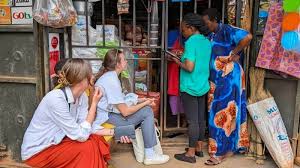When University of Notre Dame senior Monay Licata traveled to Kampala, Uganda, she expected to study how businesses in emerging markets differentiate themselves from competitors. What she discovered went far beyond marketing strategies—it was a lesson in culture, community, and resilience.
Licata, who studies marketing and global affairs, spent her winter break interviewing 26 entrepreneurs from different sectors, including mini-markets, pharmacies, craft studios, spas, and sports shops. Her research explored how small business owners in Uganda build customer loyalty and stand out in a growing yet challenging economy.
“Before my trip, many people told me Ugandans are kind, welcoming, and caring,” Licata said. “I saw this everywhere—from homes and churches to business places.”
One of her interviewees, known in the community as “Uncle,” explained that relationships mattered more than profit. “Customers are like family,” he said. “If I don’t have what they need, I send them to another shop.”
This people-first mindset revealed a sharp contrast with Western business models that often prioritize competition and profit margins. In Uganda, customer care and trust are central to success—even more than product pricing.
However, price remains a sensitive issue. Every entrepreneur Licata spoke with said that even when they offered unique products or services, they couldn’t raise prices because most customers simply couldn’t afford it. As a result, businesses compete through relationships and reliability rather than luxury or exclusivity.
Licata found that Uganda’s entrepreneurs operate within a fragile economic system where informal businesses dominate—many without official registration or access to formal financing. Yet these businesses play a crucial role in supporting families, creating jobs, and strengthening communities.
“Entrepreneurship in Uganda isn’t just about making money,” Licata observed. “It’s about survival, dignity, and helping others.”
Her time in Uganda also reshaped her understanding of global marketing. She realized that strategies successful in developed economies may not work in emerging ones, where customer relationships, cultural sensitivity, and affordability drive loyalty.
“Emerging markets move at a different pace,” she reflected. “But they teach you what truly matters in business—connection, empathy, and purpose.”
Licata’s capstone project highlights the need for more research on African business practices, especially around differentiation and informal entrepreneurship. She believes understanding how culture shapes commerce is vital for future global leaders and marketers.
After graduation in May, Licata will join the Cleveland-based financial technology firm Clearsulting as a consultant. But she says her experience in Uganda will continue to shape her worldview.
“Uganda taught me that business is about people first. And that lesson will guide every strategy I create in the future.”



